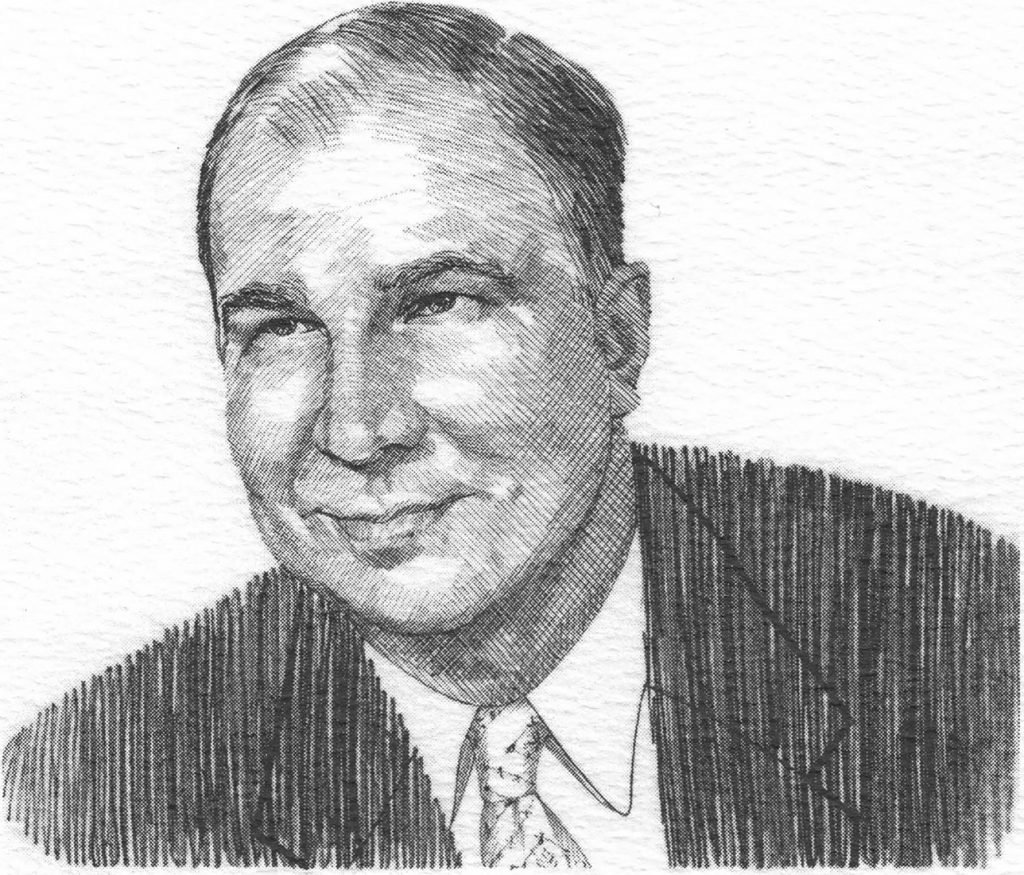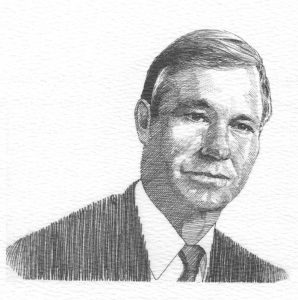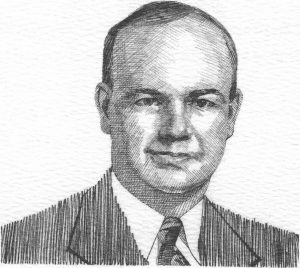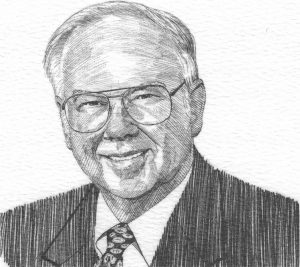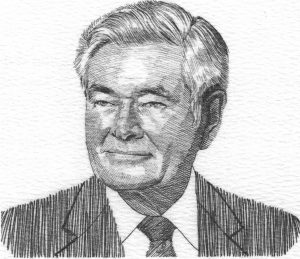An ancient Chinese proverb says, “One generation plants the trees, another gets the shade.” Early in life, Donald Campbell Brabston learned to plant trees of service for the future and to help others less fortunate. His mother, Mrs. Elizabeth Dameron Brabston, taught him to tithe to his church and serve others. Brabston’s life, including his business career and his civic leadership, has enriched the lives of countless people.
Don Brabston, CPA, was born and raised in Birmingham, graduating from Ramsay High School and Birmingham-Southern College (Phi Beta Kappa). He earned his M.B.A. at Northwestern University, where he excelled in the classroom and as a leader on campus. He was a member of Phi Beta Kappa, Omicron Delta Kappa, Beta Alpha Psi, and Beta Gamma Sigma honorary societies and was president of Alpha Tau Omega fraternity.
When World War II began, Brabston completed Northwestern’s two-year M.B.A. program in a record nine months and immediately joined the Navy. Brabston served on the battleship USS Alabama for two and a half years during World War II and attained the rank of lieutenant commander. He received nine battle stars and Philippine Liberation Ribbons.
One week after returning from the war in 1945, Brabston joined the Birmingham office of Ernst & Ernst (later Ernst & Whinney and now Ernst & Young LLP) where he retired 34 years later as managing partner of the Alabama practice. When he became a partner, the firm’s Alabama practice had a professional staff of 30. Under Brabston’s leadership, the firm’s Alabama offices in Birmingham, Huntsville, and Mobile grew to approximately 200 professional accountants, nearly all of whom were CPAs. He hired the first woman and the first African-American on the professional staff in the firm’s southern offices.
In the 1960s, Brabston saw the need for changes in the way the accounting profession served Alabama businesses. The state’s economy was becoming more diverse with strong growth in the health care, banking, insurance, and high technology industries. Also, Medicare, bank-holding companies, and other new laws regulations, and reporting requirements were dramatically affecting the demands of these industries. Brabston recognized the significance of these changes early on and adopted a strategy of developing and training staff and partners with highly specialized industry skills to address the needs of these fast-growing businesses. At the time of his retirement in 1979, Ernst & Whinney was the dominant professional services firm in Alabama, and the Birmingham office was the firm’s largest office in the South.
Brabston believed in recruiting beyond the firm’s requirements to meet the immediately foreseeable needs of Alabama businesses. This philosophy enabled him to recruit and train outstanding accountants for his own practice and for positions in the firm’s offices around the country. Fellow managing partners knew they could always call on Brabston for help whether the need was for short-term assistance requiring highly specialized skills or to fill a long-term leadership position. As a result, dozens of individuals recruited and trained by Don Brabston went on to serve as partners in firm leadership roles. Three partners (all University of Alabama graduates) eventually became vice-chairmen of Ernst & Young and served on its executive management committee, overseeing the Big Four international firm’s operations around the world.
Don Brabston built a culture at the firm which emphasized active participation and leadership in community affairs. He often told employees that “we should pay our civic rent.” He led by example, setting high standards for service in and supporting important civic affairs.
Don Brabston was a leader in the accounting profession throughout his career. In 1947, he received the Silver Medal for placing second out of about 7,500 candidates nationwide on the Certified Public Accountants examination. Brabston served in active roles with the Institute of Management Accountants for many years. He was a national vice president of the Institute and a member of its national Board of Directors and Executive Committee and president of its Birmingham chapter.
Brabston has long been involved in support of education. He has been honored as an Alumnus of the Year by Birmingham-Southern College and was a founder and the first president of Birmingham-Southern College’s Norton Center, the purpose of which is to foster relationships between the college and business. He served as chairman of The University of Alabama’s Accounting Advisory Board for many years, during which time the University’s accounting department became the School of Accountancy. He is a lifetime member of Samford University Board of Trustees, having served 31 years, and has served as chairman of the executive, business affairs, and investment committees.
During his business career, Brabston was a tireless servant and civic leader. In retirement, Brabston has remained committed to and continues actively serving his community and state.
Brabston served in leadership positions of numerous civic organizations. He served as president of the Birmingham Area Chamber of Commerce and chaired the taxation committee of the National Chamber of Commerce. While Brabston was its president in 1979, the Birmingham Chamber initiated its Crime Stoppers program which offers rewards for tips leading to arrests and convictions for crimes in the city. On behalf of the chamber, he worked hard to promote racial harmony in the city. Following an incident in which an African-American woman was shot by a white Birmingham police officer, Brabston led a negotiating team of community leaders in successfully addressing the concerns of African American citizens. This effort was critical in preventing an economic boycott and potential further serious conflict.
Brabston served as Chairman of the Board of United Way of Central Alabama in 1975, 1976, and 1981 and is the only chairman in the history of that organization to serve three times in that capacity. He was one of the founders instrumental in establishing the United Way Community Food Bank and was a member of its board of directors and its treasurer.
He was chairman of the Salvation Army and recipient of its highest award for a lay individual, the William Booth Award. Brabston has been a trusted advisor to commanders of the Greater Birmingham Area Salvation Army for 40 years and he is an Emeritus Member of the Advisory Board.
Brabston was chairman of the Young Men’s Christian Association of Birmingham for several years and a trustee of the YMCA for over 25 years, as well as chairman of its Capital Funds Campaign. During his tenure as chairman, the first African-Americans joined as members of the Birmingham YMCA.
He served as vice president, treasurer, and a member of the Board of Directors of the Birmingham Football Foundation, Inc., and as chairman of the Board of Trustees of the Alabama Association of Independent Colleges and Universities (for three years), as well as president of the Baptist Hospital Foundation and director of its Baptist Hospital Service Corporation. He was a member of the Community Foundation of Greater Birmingham Steering Committee, as well as a director and member of Rotary Club of Birmingham. He has served on the board of the Birmingham Chapter of the American Red Cross and other civic and charitable organizations, including the Greater Birmingham Convention and Visitor Bureau, Executive Service Corps of Birmingham (as a founder and chairman), and the Metropolitan Arts Council (as chairman of Its allocations committee). He was a member of the first Oil and Gas Board of Alabama.
Brabston is a life deacon and has served as chairman of the board of trustees, chairman of the board of deacons, and chairman of the finance committee (for over 25 years) at Mountain Brook Baptist Church and is a member of the church’s Endowment Trust Fund Board.
While a student at Northwestern, Brabston met and married Mary Jane Coolman, his wife of 53 years until her death in 1996. He has a son, Donald C. Brabston, Jr. of Manhattan Beach, California, and a daughter, Mary Elizabeth Brabston, of Winnipeg, Manitoba, Canada, and one grandson, Benjamin Kenneth Forman Brabston of Manhattan Beach, California.
Another old Chinese proverb proclaims, “The best time to plant a tree was 20 years ago. The second best time is today.” Although he paid his “civic rent” long ago, Don Brabston’s dedication to service today at age 83 is as active as it was as a boy when his mother first taught him to tithe. Brabston’s trees of service have grown tall and continue to grow straight and strong. And the shades from his trees have benefited and “will continue to benefit people.”

